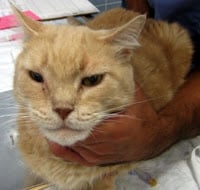You may have heard of acromegaly, but do you know what it is?
Acromegaly is a disease caused by a tumor (usually a functional adenoma) in the pituitary gland. It causes an excessive amount of growth hormone (GH) release which is produced in the anterior lobe of the pituitary gland. Because of the tumor, the pituitary cannot respond to negative feedback and continues to overproduce the GH.
Growth hormone stimulates production of insulin-like growth factor (made mostly in the liver). Over time, insulin resistance develops, and cats with acromegaly will develop diabetes that is difficult to control. These cats will continue to gain weight as a result and may develop features of enlarged head or paws, broad face, or protruding mandible.
It is most common in middle-aged to older male cats. Cats that have uncontrolled diabetes that are gaining weight could have acromegaly. Remember, most cats with uncontrolled diabetes tend to lose weight, not gain weight. The opposite is true for acromegaly cats.
There is no single diagnostic test, but the serum insulin-like growth factor-1 level is the most used test. A recent study suggested that this level is 84% sensitive and 92% specific for diagnosing the disease. Advanced imaging, such as MRI, is needed to identify a pituitary mass.
Treatment of these cats is very difficult. There are no good treatment options. Insulin is often increased but usually only helps temporarily. In some cases, high doses of insulin can lead to sensitization of cats to insulin and lead to hypoglycemic crisis. In humans, use of somatostatin analogues is a treatment option, but studies showed no benefit in cats (over a 3-6 month treatment course one study showed). In humans, surgical removal of the tumor is the treatment of choice. While this may be an option in cats, few owners are willing to go this route due to the risks and age of the patients. To put it more simply, most owners do not wish to put their older cats through brain surgery. Radiation is another option and has had some good success in cats. Cost of radiation is a concern for many owners, however, this may be the best option to consider for otherwise healthy cats. Long term prognosis for acromegaly cats is poor in general, as many cats will develop secondary complications from their uncontrolled diabetes.
Hopefully in the future there will be better data on acromegaly treatments. Clients get frustrated when their cat has diabetes and it is difficult to control them. This is a disease to consider screening for in those cats. This makes client education about this disease and diagnosis important.


